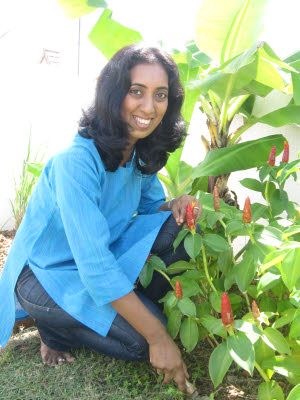Interview by Vani Viswanathan
[box]Where are we headed as a species inhabiting Planet Earth? It doesn’t take much time to realize that we are walking steadfast into ruin – our actions are having a debilitating effect on the environment, we all know it, but are we doing anything about it? Vani Viswanathan chats with Bhavani Prakash, environment activist and founder, Eco WALK the Talk, on whether there is any hope for our future on this planet – and maybe there is. [/box] [box type=”bio”]Bhavani Prakash is an environmental activist based in Singapore. She has a Masters in Financial Economics from University of London and a Diploma in Management from Indian Institute of Management, Kolkata, India. Eco WALK the Talk was founded in 2008.[/box] You step into a supermarket and see a sign saying ‘Bring your Own Bag,’ prompting you to reduce the number of plastic bags that they have to give you for your grocery shopping. Your email signature has a mandatory sentence ‘Please do not print this email unless absolutely necessary.’ You see advertisements for energy efficient refrigerators and water heaters, and there are campaigns on Facebook to save the tiger.
You step into a supermarket and see a sign saying ‘Bring your Own Bag,’ prompting you to reduce the number of plastic bags that they have to give you for your grocery shopping. Your email signature has a mandatory sentence ‘Please do not print this email unless absolutely necessary.’ You see advertisements for energy efficient refrigerators and water heaters, and there are campaigns on Facebook to save the tiger.
The mindboggling number of campaigns of various types to save the earth might make even the hopeful cynical. Is green just the new black, and is environmental activism simply a marketing gimmick, with many companies jumping on the bandwagon to capitalize on the increasing attention devoted to the topic? The everyday consumer seems to be exposed to innumerable messages to do with saving the environment that at the end of the day leave her or him apathetic. Are we running a risk here?
Bhavani disagrees. ‘I don’t think we’re doing too much at all. Just walk into any air-conditioned supermarket and you’ll see how much work there is left to be done in terms of wasteful packaging, toxic food additives, pesticide laden food products – both vegetables and processed foods, toxic home cleaning products and so on. We do need various campaigns, because environmental issues have many layers. If you take one form of activism, say animal rights – you could have targeted campaigns for meat reduction, or against animal testing in cosmetics, or anti-leather, or anti-fur.
There are targeted campaigns for endangered wildlife species like tigers, rhinos, or even the Gangetic Dolphins – even though the fundamental factors in these may overlap, you would need that kind of focussed attention.’
What these campaigns do, Bhavani says, is to keep the discussion going and raise awareness – the first steps in creating change. ‘The range of campaigns is necessary to attract a wide group of people with a wide variety of interests,’ she says.
Today’s consumer is certainly well-aware of the fight against environmental decay and the pressing issues with regard to the environment, diverse though they may be – thanks in large part to the conscious efforts taken by non-governmental organizations to engage people in environmental issues. What’s encouraging, says Bhavani, is that children are being brought up with high awareness too. ‘Schools the world over do teach a lot about the environment, so more often than not, it is the child who’s coming back home and telling the parent not to do this or that,’ she says.
Awareness is high, but is it translating to action? Yes, says Bhavani – if you look at the number of eco-conscious products hitting the shelves and the growing conversations in families and organizations on ways to reduce the negative impact of our actions on the environment.
The main issue, it seems, is the need to incorporate sustainability into everyday life and recognizing that it is not an ‘add-on’ but an essential component of our daily actions. This works on two levels – at the external level, it is about encouraging schools, corporates and governments to implement systemic changes that will move the needle in terms of enforcing sustainable practices and driving awareness of the consequences of doing otherwise. Bhavani cites what schools could do as an example. ‘A Geography lesson should not just talk about the distribution of metals or forest resources, but the impact of extraction on the environment or on local communities. A chemistry lesson should not deliver merely a detached look at carbon molecules or other compounds, but what that learning means in terms of climate change or toxicity to water and human health. Sustainability thinking will then become a habit from a young age.’
At the personal level, it is about helping the individual understand that her or his actions can make a difference. Very often, the apathy from individuals comes from the belief that their actions will have no effect when you look at the big picture. ‘Action has to be taken by a sufficiently large number of people to make a difference,’ she opines. The need of the hour, she says, is to encourage the individuals to capitalize on their awareness and start by making a difference and motivate others around them to do so too. ‘There is a so-called bridge between ecological knowledge and green action. Having a role model or “mentor” to show the way can really help people make the change. These mentors can be found in books, on the internet, within your community or country. You just have to seek them. We need many more mentors in society to lead and show the way.’
Bhavani speaks from personal experience. A graduate of the prestigious Indian Institute of Management, Kolkata, Bhavani first started thinking about environment-related issues when she studied environmental economics as part of her Master’s course in economics in the University of London. Her volunteering experience at Singapore’s Botanic Gardens only deepened this interest, eventually leading to the founding of her website Eco WALK the Talk.
The website is a platform for discussion on various issues to do with the environment and features news, insights, interviews with individuals who inspire through their support to the earth’s cause, as well as tips to make your life green. At a personal level, Bhavani does ‘walk the eco talk’ too – she is vegetarian, consciously doesn’t own a car, preferring to walk or use public transport, takes care to switch off the light bulb when she leaves a room, and carries her own bag to the supermarket. She is a passionate advocate of organic gardening and tries to grow a variety of food plants in her small roof garden. She prefers to compost her kitchen waste and use non-toxic, home-made cleaners.
Indeed, it doesn’t sound that difficult at all. ‘Never, for a moment, doubt that you can make a difference in this world,’ says Bhavani. ‘Show how you can leave a smaller footprint on this planet and inspire others to do so too.’
Click here to read about Bhavani’s latest initiative to raise awareness about the Gangetic Dolphin that is on the verge of extinction. Eco WALK the Talk can be found at http://www.ecowalkthetalk.com/blog/.
Awareness is high, but is it translating to action? Yes, says Bhavani – if you look at the number of eco-conscious products hitting the shelves and the growing conversations in families and organizations on ways to reduce the negative impact of our actions on the environment.
The main issue, it seems, is the need to incorporate sustainability into everyday life and recognizing that it is not an ‘add-on’ but an essential component of our daily actions. This works on two levels – at the external level, it is about encouraging schools, corporates and governments to implement systemic changes that will move the needle in terms of enforcing sustainable practices and driving awareness of the consequences of doing otherwise. Bhavani cites what schools could do as an example. ‘A Geography lesson should not just talk about the distribution of metals or forest resources, but the impact of extraction on the environment or on local communities. A chemistry lesson should not deliver merely a detached look at carbon molecules or other compounds, but what that learning means in terms of climate change or toxicity to water and human health. Sustainability thinking will then become a habit from a young age.’
At the personal level, it is about helping the individual understand that her or his actions can make a difference. Very often, the apathy from individAwareness is high, but is it translating to action? Yes, says Bhavani – if you look at the number of eco-conscious products hitting the shelves and the growing conversations in families and organizations on ways to reduce the negative impact of our actions on the environment. The main issue, it seems, is the need to incorporate sustainability into everyday life and recognizing that it is not an ‘add-on’ but an essential component of our daily actions. This works on two levels – at the external level, it is about encouraging schools, corporates and governments to implement systemic changes that will move the needle in terms of enforcing sustainable practices and driving awareness of the consequences of doing otherwise. Bhavani cites what schools could do as an example. ‘A Geography lesson should not just talk about the distribution of metals or forest resources, but the impact of extraction on the environment or on local communities. A chemistry lesson should not deliver merely a detached look at carbon molecules or other compounds, but what that learning means in terms of climate change or toxicity to water and human health. Sustainability thinking will then become a habit from a young age.’ At the personal level, it is about helping the individual understand that her or his actions can make a difference. Very often, the apathy from individuals comes from the belief that their actions will have no effect when you look at the big picture. ‘Action has to be taken by a sufficientlyuals comes from the belief that their actions will have no effect when you look at the big picture. ‘Action has to be taken by a sufficiently





